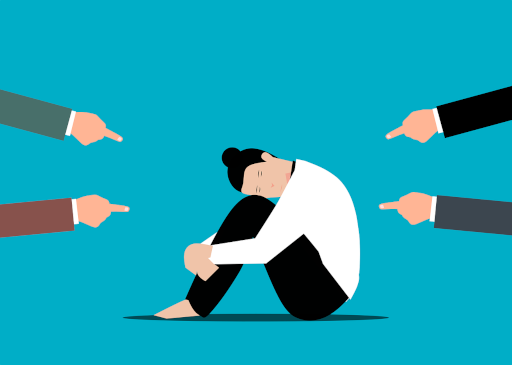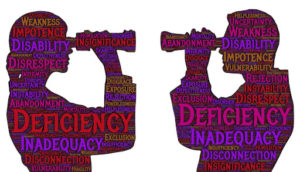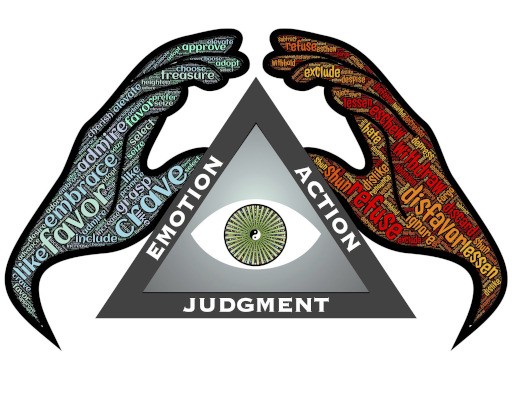Being judged is hard, even when we deserve it. Being judgey can likewise be hard, even when the person judged deserves it. We all face constant judgment and we all constantly make judgments.
Judging and fear of judgment take many forms.
- Fear of getting counseling, lest you be perceived as weak, can keep you in patterns you can’t shake and to cause you to go without help.
- Fear of proceeding with divorce, lest you be judged, can keep you stuck in a bad marriage.
- Fear of facing judgment by reporting and escaping domestic violence, can cause you to endure more.
- Criticism unintentionally (or intentionally) so severe that the criticized person feels emotionally abused, can irreparably destroy your relationship with the person.
- Self-loathing after adultery or embarrassing activities can cause you to make concessions in a divorce or rush to “get it over with,” rather than to consider a meaningful apology.
- Obsessively seeking judgment measured by “likes” and “friends” on your phone, while your partner, kids, and pets who love you are sitting right there, can further disconnect you and drive you and your loved ones into further silence.
When not received or delivered thoughtfully and properly, judgment can cause harm. There are ways to handle being judged and being judgey.
Being Judged
 Being judged can be painful. Being judged by others punches the ego (and often the heart) hard. It causes frustration, resentment, hurt, and self-doubt.
Being judged can be painful. Being judged by others punches the ego (and often the heart) hard. It causes frustration, resentment, hurt, and self-doubt.
But being judged is not always bad. Healthy competition drives us to develop our brains and be our best selves.
And being judged is unavoidable, right? Ask anyone who holds a job. Owners judge management, management judges supervisors, and supervisors judge line employees. Oh, and customers judge the owners (or the product, or the services). Students are judged by their instructors. Actors are judged by everyone. Inviting constructive judgment in these relationships can foster improvement.
Tips For How to Deal with Being Judged
 How do you deal with being judged? You can’t control what other people think, right?
How do you deal with being judged? You can’t control what other people think, right?
Here’s what I tell my collaborative clients:
- It’s not about you; it’s about The Judger. Sometimes, it’s simple deflection or even projection.
- What The Judge thinks is irrelevant. What do you think?
- It’s not your job to convince The Judge of anything.
- Detach from the judgment. This kind of detachment is healthy. You can’t stop the judging and it will protect you from harm.
- And, if you’re triggered by judgment, perhaps you’re really upset because it’s not wrong. Is this something you were already feeling insecure about? If so, then your reaction might be showing you need to fix yourself.
Being Judgey
 Now let’s look at judging from the judger’s perspective. Being judgmental by, calling out behavior that might harm us or someone else, can be healthy. This is especially true when we intend to protect each other.
Now let’s look at judging from the judger’s perspective. Being judgmental by, calling out behavior that might harm us or someone else, can be healthy. This is especially true when we intend to protect each other.
We are judgmental by nature. We learned to judge to preserve ourselves from harm, from wild animals, from plague, from objects falling out of the sky. The COVID pandemic has intensified what we’ve learned about judging. Because COVID is so top-of-mind and stressful, we may judge people and things more swiftly and harshly than we ordinarily would.
So how do we prevent our being judgey from ruining our relationships?
Tips For How to Deal with Being Judgmental
 How do you deal with being judgmental? You can’t control what other people do, right? Here’s what I tell my collaborative clients:
How do you deal with being judgmental? You can’t control what other people do, right? Here’s what I tell my collaborative clients:
- Have you misjudged the situation? Try putting on the other’s shoes. Consider the person who doesn’t “look” like a person with a disability but who parks in the disabled person parking space and has the required signage. Is the person’s mobility impairment just not visible?
- Is there an alternative viewpoint? Again, try on the other’s shoes. Consider the driver who cut you off. Were you in his blind spot?
- What do you want to accomplish? Will you be injured by your target’s actions or inactions? Is your target likely to change the behavior?
- How might you damage the person you judge?
- Is your relationship worth risking? These days, we’ve all heard of sisters who no longer speak, of close friends who have sacrificed valuable friendships, and of families who no longer celebrate holidays together.
- What is triggering your judgment? Is this something you need to focus on, rather than being judgmental? Are you avoiding judging yourself?
Judgment and the Collaborative Process
 Where do Being Judged and Being Judgey factor into resolving disputes?
Where do Being Judged and Being Judgey factor into resolving disputes?
The Collaborative Process encourages honest, positive communication without destructive judgment. Your collaborative team can help modulate your reaction to being judged and your temptation to being judgey.
To restructure your family, visit us at Open Palm Law or email me at Joryn@OpenPalmLaw.com. We are here for you, and for your children, during whatever change your family is going through! “There are two sides to every story.” Whether you are being judged, or you are being judgey, we can help you with that, too.






